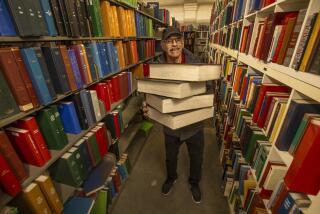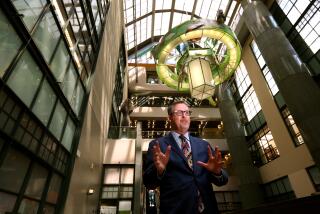Engineer With Unusual Skills Faces His Biggest Challenge
- Share via
In 1979, Eric Lundquist was an insurance adjuster surveying damage in a Mississippi flood. Confronted with a client’s soaked files, he looked for equipment specifically designed to dry them. Nothing was available.
That set Lundquist, who had a degree in mechanical engineering, to thinking.
What followed was an idea that was rebuffed by investors and regarded as quixotic by other document-salvaging experts--a mobile document preservation machine.
These days, Lundquist owns seven 45-foot-long vacuum chamber machines, each capable of slowly sucking the last drop of moisture out of 10,000 books or 13 million documents. He stations them in his hometown of San Francisco and in Iowa, Virginia and Nova Scotia and quickly dispatches them in response to floods and fires.
In only a few years of operation, he has become a widely used consultant when natural disasters strike libraries or businesses files, and on Wednesday he began facing the biggest challenge of his career: coordinating the removal and salvage of more than 1 million volumes damaged in Tuesday’s Los Angeles Central Library fire.
“It’s probably the biggest job in the world,” he said.
On Wednesday, though, the biggest job was a lot of small chores: arranging for cardboard boxes to hold soaked books, arranging for pallets to hold the boxes, arranging for trucks to take the pallets of books to a cold-storage facility in Vernon, trying to find 40,000 square feet of space to “air out” those books that had been only slightly dampened.
There is nothing technologically unique about what the 41-year-old Lundquist does. Librarians have been putting soaked books into freezers for 40 years, according to Peter Waters, the Library of Congress’ conservation officer.
“All we do is a little heat transfer, a little thermal dynamics,” said Robert Ritchie, who was an engineering classmate of Lundquist’s and is now a business associate in Lundquist’s Document Reprocessors of San Francisco.
Lundquist’s enemy is mold or mildew. A fire-ravaged library is a perfect breeding ground: high temperatures from the dead embers, high humidity from thousands of gallons of water sprayed by firefighters and precious little ventilation deep in the stacks.
Freezing cannot kill mold, but it can thwart it. Lundquist tries to freeze books by a technique known as “blast-freezing”--bringing their temperature down to zero degrees Fahrenheit within a few hours. Quicker freezing means smaller ice crystals and an easier transition from ice to dryness, he said.
The trick in drying is to do it very slowly--from seven to 17 days, depending on the moisture content of the frozen documents--so that water stains or new mold or mildew do not form as the ice evaporates, Lundquist said.
Lundquist’s $350,000 tanks pump out all moisture. Then, after the books are removed from the drying machines, they are usually not handled for a number of days, until a normal level of moisture has returned.
Lundquist and his wife and business partner, Muriel, said they were turned down when they sought loans to form their venture.
‘We Did It Ourselves’
“No one would invest,” Muriel Lundquist said. “The bankers wouldn’t have anything to do with us because there’d be no one to sell the equipment to if we went under. So we did it ourselves. Whatever we made from each job was totally reinvested in new equipment.”
Timing was on the Lundquists’ side. They have benefitted from research done at the University of California, Berkeley, which was just beginning a library conservation program that has made it the primary center in California for book preservation. They also consulted with Stanford University, which had worked closely with Lockheed engineers and conservationist Waters in handling a 1978 library flooding at the campus.
Waters, who said he knows Lundquist well, admitted that he is surprised that the mobile drying business has survived.
“When he mentioned the idea several years ago I thought it was good but I didn’t think he’d do it,” Waters said. “Frankly, I did not believe there were that many disasters” to keep the company in business. “But he has kept his ears and eyes glued on the scene. I think he’s the only person that I know of in the country who is prepared to turn up on-site and give this service.”
Charles Perkins, general manager of a Virginia credit union that was hit by a massive flood last November, said that without Lundquist’s mobile service, “we probably would have done like a lot of other people did, which is to buy out all the hair dryers in the city” to dry out documents. Lundquist salvaged “99.9%” of 160 cases of documents representing $13 million in credit union loans, Perkins said.
More to Read
Sign up for Essential California
The most important California stories and recommendations in your inbox every morning.
You may occasionally receive promotional content from the Los Angeles Times.













